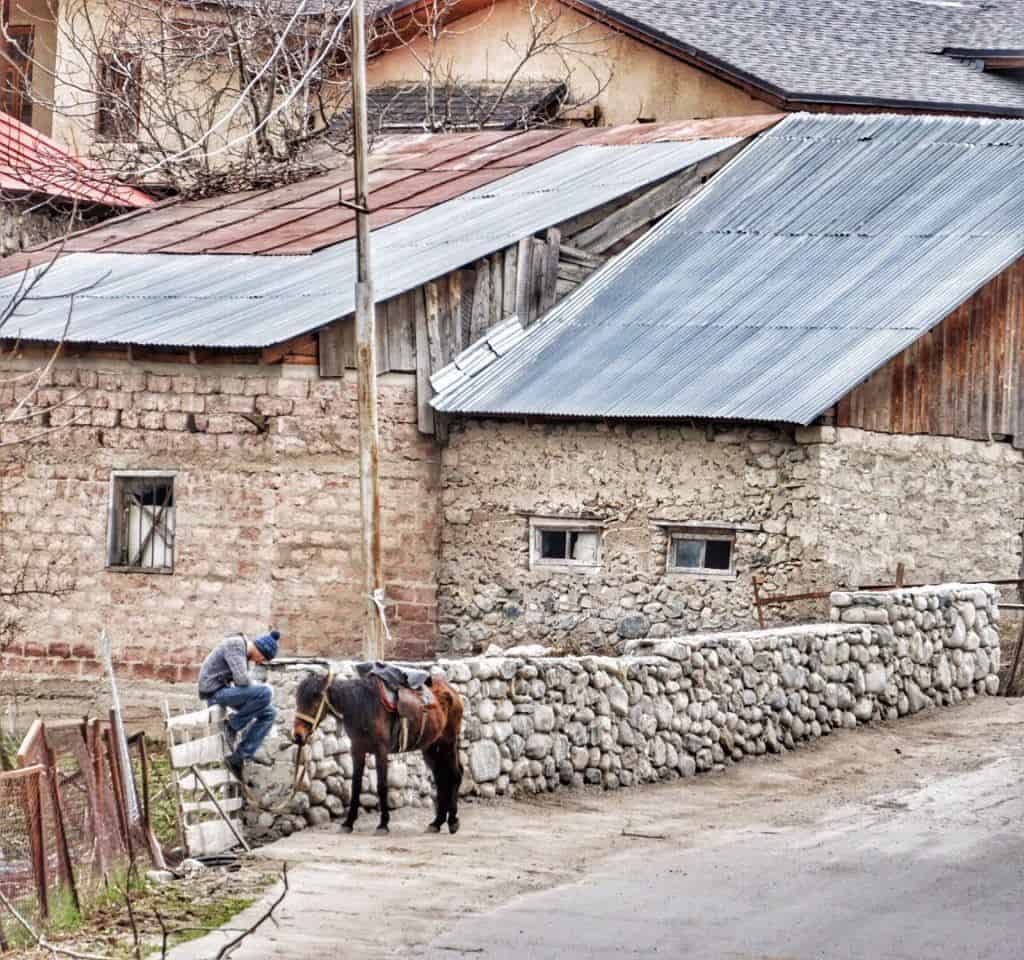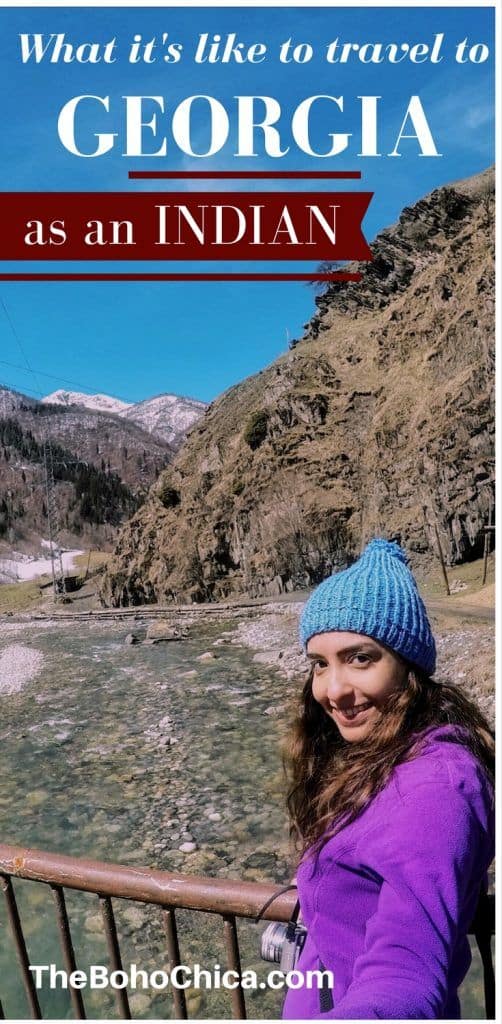Disoriented and fuzzy, I sat in the dining hall of the guesthouse in Mestia, the central town in Georgia’s Upper Svaneti region. Lali, the housekeeper who’d greeted me at the door and ushered me in, away from the chilly mountain air, brought me just what I needed; a glass of water, cup of tea, warm khachapuri, fried eggs, and not a single question. “You eat first,” she said, kindness shining in her eyes, and with a gentle tap on my shoulder, she left me to eat and recover from an overnight train journey and a three hour drive through serpentine mountain roads.
A group of Americans sat at the next table, discussing their trekking plans for the day. I fleetingly glanced at the screen of the small TV above the bar where Indian village women stood decked out in embroidered sarees and ornate jewelry. Wait, what?
I looked up again to confirm that I had in fact seen Indian women seemingly conspire in Georgian and my suspicions were confirmed. Behind me, a woman who could have been Lali’s mother stood staring at the screen, engrossed. Somehow, Hindi TV soaps had made it big enough in Georgia for people, whose culture had nothing in common with Indian culture at least on the surface, to want to watch them.
“We love Hindi serials,” said Lali when I asked her about it afterward. “But aren’t they too dramatic?” I thought to my Netflix binge-watching self. Not even a lot of young Indians can relate, and yet, here in this little mountain town, miles away from India, with little in common, Hindi TV shows have a strange appeal.
Later that afternoon, bundled up in warm layers, I walked around the cobbled town center, smiling silly as soft snowflakes welcomed me. “I’m Indian,” I said, when stopped and asked by a local more than once, and found myself wondering if their lingering gazes were caused by curiosity, caution, or admiration for the color of my skin. After all, I didn’t see a single other brown or black person around.

“Ahhh India,” an enthusiastic matronly Svan woman repeated after me, her silver hooped earrings dangling as she scooped me into a hug. In Svan, she said something to the effect of “A pretty girl like you shouldn’t be alone,” and then offered to find me a nice eligible Svan man, to which I pointed to my wedding ring and used my hands to indicate the roof of a house- my man was back home.
“Where are you from?” the young man with pale skin and green eyes at a café in Mestia asked me as he placed the menu on the table. “I live in Dubai but I am Indian,” I said, summing up the two important parts of my identity. “India,” he said, his eyes widening slightly as if they’d be better equipped to clearly see some of that Indian-ness, “You is very nice. India very good.” As I browsed the menu, I was acutely aware of a set of eyes on me, then two, as a young woman had now joined him behind the counter. I looked up at them and they smiled, still looking at me before he walked over to take my order.
The first time I walked by the impressive façades on Rustaveli Avenue in Tbilisi, I couldn’t help but think of how different it felt from the broken buildings and narrow backstreets of the old city. At the sound of a familiar tune, I slowed down and turned my attention to a corner by the entrance to a metro station.
On his accordion, an old man in a cupola played the tune of pyaar hua, ikraar hua, the classic Raj Kapoor song known to every Indian 20-something, his smile widening as he saw me come closer. I stood there, listening to this old song from a Bollywood movie become the background score for the stories of everyone on that street in Tbilisi, if only for a few moments.
A few days later, a jolly old man, tipsy on chacha insisted on engaging my husband in conversation, as we sat on a bench in a Tbilisi park, licking on dreamy whirls of gelato, like children. Their conversation, the man’s in Georgian and my husband’s in English, was a funny but welcome distraction to the others in the park. “India,” my husband said as he pointed to himself, to which the man replied, “India, ahhhh India,” raising his right hand to some imaginary reference point, bottle of chacha dangling from his left hand. “Raj Kapoor,” he said, his face bursting with the excitement of someone who despite the language barrier had finally managed to communicate. “Jimmy jimmy,” referring to another Bollywood song from the glory days of disco, he proceeded to twirl around, presumably to the song, now undoubtedly playing in his head, encouraged by the toothless grin of the elderly Georgian woman who shared our bench.
I don’t tend to think too much about the color of my skin while traveling. Perhaps the obliviousness to what people may think about it comes from having spent most of my life in Dubai, a multicultural city where there’s plenty of racial diversity and so many who look like me.
As an Indian abroad, I’m almost always certain that I’ll see, at least a few other Indian faces in a new city, because there are so many of us living and traveling around the world.
Every once in a while, I’ll find myself to be the only brown person in a town or village and that will serve as a reminder of just how far I’ve come, to a place where the color of my skin is unusual, intriguing, or downright fascinating.
Like that one time on a remote island in Sweden, where the young cashier at the lone supermarket stared at my skin, browner from weeks of tanning, while I packed the groceries, then smiled and blushingly apologized, “I’m sorry but I have never seen someone who looks like you.”
And that’s just it- the thing I’ve experienced most is a curiosity rather than any kind of negative bias. There are the usual questions about my English speaking skills, (“How come your English is so good?”), arranged marriages, the status of women, and crimes against women in India. But I don’t blame people for asking, after all, they’re only trying to understand if the stereotypes and media portrayals of Indians are true.
In Georgia, I was a little taken aback to see that the locals actually seem to like Indians a lot. It wasn’t just curiosity, but often, it seemed like admiration- a first for me as an Indian traveling abroad. I couldn’t understand why despite the lack of cultural common ground, Georgians would hold Indians in such high regard and why they would warm up to me after learning I was Indian.
“Wow, India! Really?”, a vendor’s daughter said to me at Tbilisi’s Dry Bridge Market as I browsed through what could have been a shelf in her grandma’s kitchen; classic cutlery, gold Soviet-era teaspoons, ornate chalices, and Chinese teacups. “Indians are good people, we like Indians. Are you from Bombay?”
I’m not used to hearing praise for my country but I had to admit, it felt great, even if I could not understand why.
When it comes to the role of differences in travel narratives, whether they’re of the geographical, cultural, political, or racial kind, it can seem like their only purpose is to segregate, highlight the otherness, and to emphasize how or why one does not belong somewhere.
But what if, in fact, this very otherness caused people to take an interest in you? What if your otherness actually served as an icebreaker, and what if, for the first time in a long time, this otherness felt like something to be proud of?
After all, contrasts can be beautiful. Georgia, as a country, is home to some remarkable contrasts, as the observant traveler will note and something my friends at Lost With Purpose wrote about here.
My highly positive experience as an Indian in Georgia made me realize that more often than we realize, differences are awesome; they help people bond and learn about each other. They make things interesting and add the kind of value to interactions that only diversity can bring.
And that’s one more reason to not be afraid of venturing to far-flung places where not a lot of people from your country go. Because you never know, meeting you might just be the highlight of someone’s day there.
Over to you: Tell me have you ever traveled somewhere that made you feel special (in a good way) because of your race or nationality? If you’re an Indian who’s traveled to Georgia, I’d love to know more about your experience. If you enjoyed this post, please share it to Pinterest.

Plan your Georgia Trip
- Browse hotels on Booking.com or Hotels.com
- Book a private transfer with Welcome Pickups
- Book tours and day trips with Get Your Guide
- Browse flights on Skyscanner
- For digital nomads, SafetyWing Insurance is currently the best option
Visiting Georgia? You might want to read this guide to Georgian visas and might be interested in these posts:
Ultimate Guide to Tbilisi: Things to do, where to stay, eat, shop and practical information
This post contains affiliate links. If you make a purchase using these, I might get a small commission with no extra cost to you, which goes towards running this site.

Sushil Kumar Chamaria
Wednesday 7th of July 2021
I was in Tbilisi, Georgia for 2 years between 2007 and 2009. I loved my stay over there. People were very friendly and courteous, especially when they come to know if you are from Induli, as India is pronounced. I never faced rudeness iny entire 2 years stay. Food was my weakness, as I am a strict vegetarian, in parties my friend Levan Nemsadze who was my companion and would be with me in most of the places would go out of the way and get vegetarian food arranged in most of the restaurants. Customs, immigration, banking and fellow business men were friendly and cooperative. Not only Raj Kapoor, even Mithun Chakraborty song Goron ki naa kaalin ki song was very famous. Ppl would recognise Aishwarya Rai and many other film personalities. Many would ask for Goa their dream destination and few for Sai Baba. Few still had illusion that in India do we still do snake charming. But all was good and I thank every single Georgian for being friendly.
Anju
Saturday 1st of June 2019
Hi Natasha, a beautiful post and one of the very few with a different perspective to this lovely country. I'm planning a trip from India with my friends. I read a lot of negative posts online about strict immigration officials refusing entry and deporting Indians to people being rude to anyone who looks remotely Arab or has brown skin. My group is already getting jittery, especially because this is going to be a girls only trip.
Natasha Amar
Saturday 1st of June 2019
Thanks Anju! That was not my experience but I am aware this was happening a lot. It seems that a lot of Indian farmers have bought land in Georgia, and then have engaged in unruly behavior in those places- but I can’t speak to how true that is. I do hope that you’ve got your visas in advance though as my case was different with being granted visa on arrival thanks to my UAE resident visa. Let me know how it goes!
Kevin Axe
Friday 10th of May 2019
I wonder if Georgians had a positive view of India because of the popularity of Indian films in the Soviet era, as described here: https://99percentinvisible.org/episode/from-bombay-with-love/. Hitchhiking with an Estonian, a lot of Georgians brought up a recent Estonian/Georgian Academy Award nominee that was big news when I was living in Estonia: https://en.wikipedia.org/wiki/Tangerines_(film).
Gurpreet Virk
Monday 26th of November 2018
Hello Natasha, great to read about your views on Georgia. It was nice to know your interesting journey there.After reading this, I am sure will visit Georgia Soon. :-)
Nathan Anderson
Wednesday 6th of June 2018
Hey Natasha! I loved the way you structured this post -- a series of vignettes describing your interactions with everyday Georgians. That one about the dancing old man was especially great!
As a former host of #TravelIST, I've gotten questions from a few Indians about Georgia. Like someone else commented previously, there seem to be a lot of bad experiences people have had that dominate the conversation... I'll be saving this post to send to people in the future to give them a positive point of reference as well ? Thanks!
Natasha Amar
Wednesday 6th of June 2018
Glad to hear it Nathan! There are always reasons behind negative experiences, at least I like to think of it like that, that most people, at their core, are good, and positive even if sometimes curious about people who don't look like them or talk like them. My experiences around Georgia were mostly positive and I'd love to add these to the conversation.